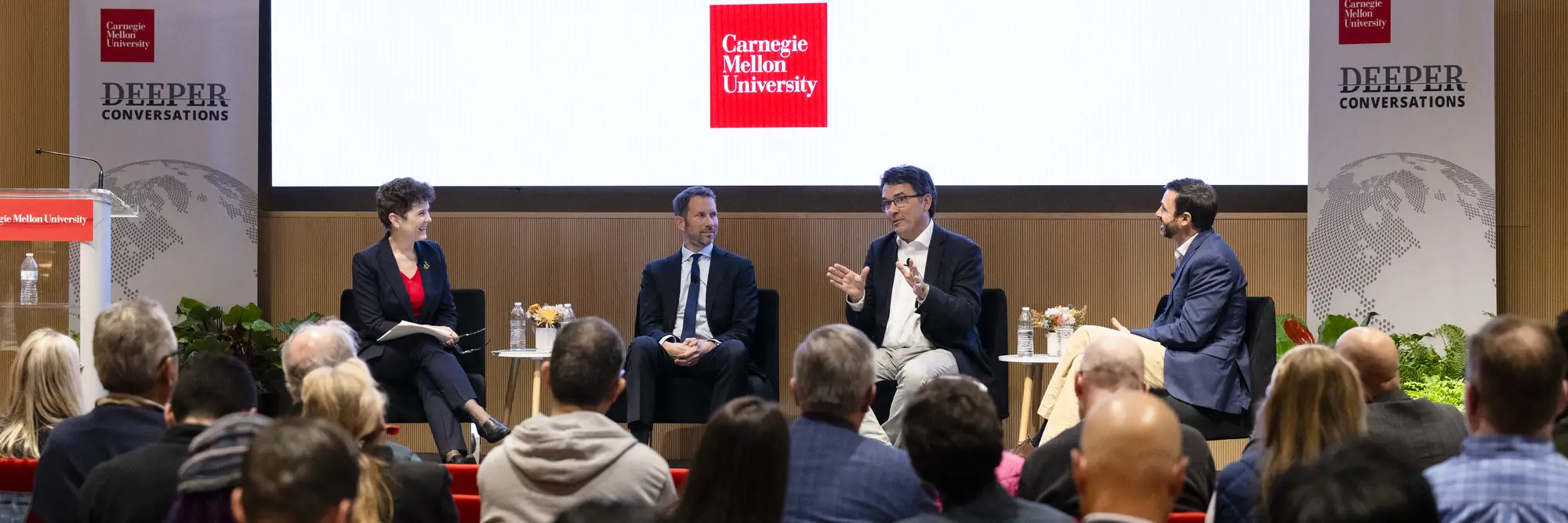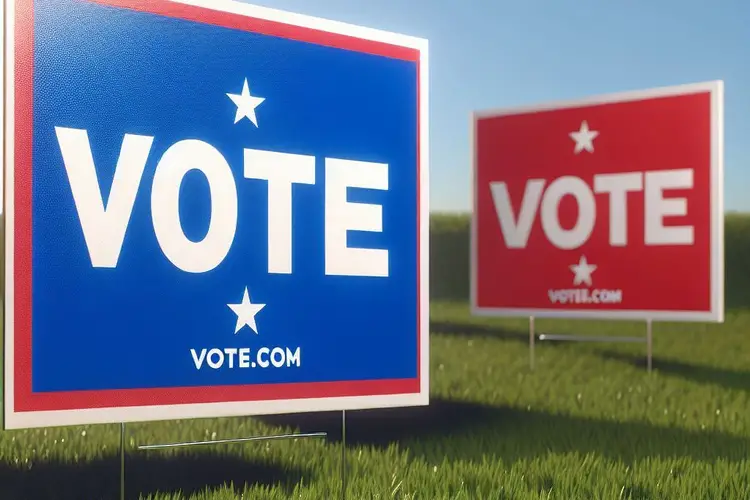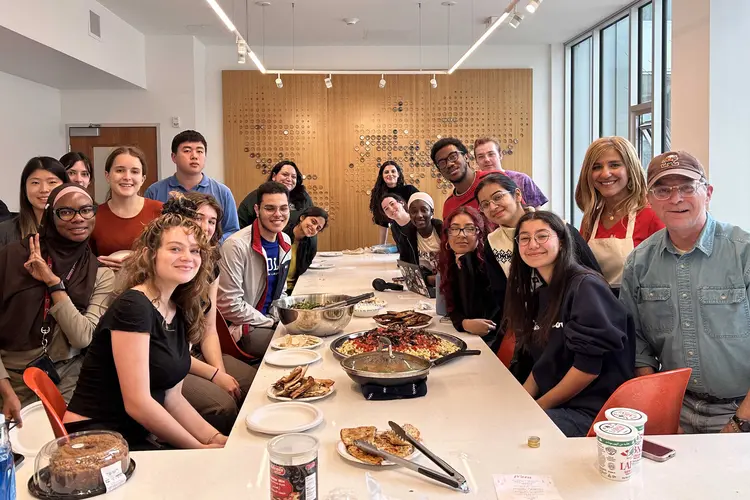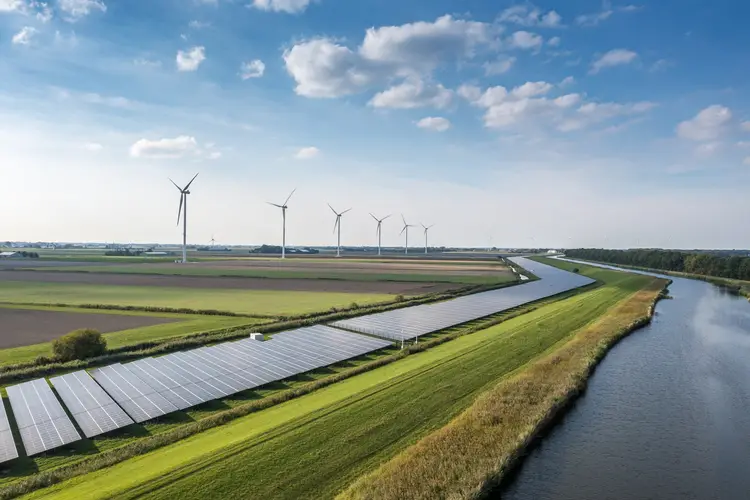
CMU Community Engages on Election Issues Through Deeper Conversations
Media Inquiries
Across the country, American citizens engage in debate every four years over the issues facing the future of the nation, and then cast ballots to determine who will serve as the next president of the United States.
As an institution educating the next generation of leaders, scholars and innovators, Carnegie Mellon University launched its Deeper Conversations(opens in new window) series to facilitate free expression and explore divergent viewpoints. This fall, the series devoted programming to the U.S. election, offering the CMU community a space to engage over topics like polarization, immigration and election interference.
Richard Scheines(opens in new window), Bess Family Dean of the Mariana Brown Dietrich College of Humanities and Social Sciences(opens in new window), and Ramayya Krishnan(opens in new window), dean of the Heinz College of Information Systems and Public Policy(opens in new window), led the most recent programming for the Deeper Conversations initiative, meant to navigate difficult issues in real time.
Presenting challenging perspectives and promoting open-minded thought are not only important as a part of CMU’s mission, but also as part of our nation’s founding ideals, according to CMU President Farnam Jahanian(opens in new window).
“The difficult work of coming together for civil discourse, like we’re doing tonight, really does matter, because freedom of speech is not just foundational to our democracy, it’s a central tenet of higher education and certainly a central tenet of CMU education,” he said to introduce this fall’s “Bridging the Divide: Understanding and Addressing Political Polarization in America,” held on Sept. 11.
“As a university, and as a community of citizens from diverse backgrounds, we have a unique opportunity to model and engage in civil discourse and to lead across differences,” Krishnan said in his opening remarks for the event. “We will consider what are the issues that are at stake and the policy implications that will affect millions of people locally and globally.”
Joined by Kevin Zollman(opens in new window), Herbert A. Simon Professor of Philosophy and Social and Decision Sciences and director of the Institute for Complex Social Dynamics(opens in new window) at Carnegie Mellon; Jonathan Cervas(opens in new window), assistant teaching professor with the Carnegie Mellon Institute for Strategy & Technology(opens in new window) (CMIST); and University of Pittsburgh professor Karina Schumann, the panel discussion, moderated by Scheines, sought to explore potential solutions to the divisiveness in American politics.
“We like to think about the United States as red states and blue states, but the fact of the matter is that there are Democrats in red states and Republicans in blue states,” Cervas said. “We really are a purple America. Votes are — at least on ideology — moderate, not extreme.”
Regarding polarization, Scheines said when students have a chance to flex their critical thinking skills and discuss important issues, they recognize that the answers are more nuanced than the two parties may make them out to be.
"We have found in a lot of the classes we're teaching that given the opportunity to really have conversation where respect is the norm, we find out, one, there's many more viewpoints than people think there are,” he said. “And then, when they do get a chance to discuss and learn, they value it highly."
Join the Next Conversation
To learn more about Deeper Conversations and plan to attend upcoming events, visit the initiative’s webpage(opens in new window).
Immigration key for voters in 2024
On Oct. 1, CMU professor Brian Kovak, Princeton University professor Filiz Garip and Harvard Law School professor Sabi Ardalan discussed immigration in a virtual panel(opens in new window) titled “Immigration at the Ballot Box: Key Issue for 2024” that was moderated by New York Times journalist Hamed Aleaziz.
The group examined why people migrate, the crisis at the southern border and how immigration impacts the labor market for current U.S. workers, and the extent to which immigration influences job security, pay and benefits for existing workers.
“Political debates in the U.S. and other high-income countries tend toward the extremes when answering these questions,” said Kovak(opens in new window), professor of economics and public policy at CMU’s Heinz College.
Some argue that immigrants “take jobs” from native-born workers. Others contend that immigrants fill roles that native-born workers avoid(opens in new window), implying that there’s little job competition and that some industries would struggle to exist without immigrant labor.
“Both of these extreme arguments are inconsistent with the evidence,” Kovak said.
The idea that each immigrant worker displaces a native-born worker isn’t supported in data. In 2022, there were 30 million employed immigrants in the U.S. but only about 6.5 to 8 million unemployed people, far below the number needed to suggest one-to-one job displacement. This has been the case even in high-unemployment periods such as the Great Recession.
Data also suggests that no job is reliant exclusively on immigrant labor. Census data reveals(opens in new window) that foreign-born workers form the majority in only three of 530 tracked occupations: manicurists, agricultural graders and taxi drivers. Even within these roles, a significant portion of workers are U.S.-born.
In reality, the impact of immigrants on the labor market lies between the extremes and is well-documented.
“There is a mountain of statistical evidence on these effects, and it's clear that immigration's effects are small(opens in new window),” Kovak said, “particularly when compared to other factors such as technological change, international trade, and offshoring.” Those factors have a much larger impact on the U.S. labor market than immigration.
Crime rates have also dominated discussions about immigration. Numerous recent studies, using robust statistical methods, have examined this issue across various countries and have yielded consistently similar results.
“Immigration has minimal effect on crime rates(opens in new window) but consistently leads to increased concerns about crime among existing residents,” Kovak said. “In other words, people seem to think that immigration substantially increases crime, but, on average, it doesn't(opens in new window).”
Responsible AI Voter Guide
The Block Center for Technology and Society(opens in new window) at CMU created this video and guide(opens in new window) to equip voters with the knowledge they need to identify and combat misleading information and deepfake technologies.
Election interference
On Oct. 28, Audrey Kurth Cronin(opens in new window), director of CMIST, moderated a discussion titled “Cyber-Enabled Nation-State Influence Operations: Are Russia, China and Iran Interfering in the U.S. Election?”
The event considered how these countries use sophisticated tactics like information laundering, social media disinformation and cyber-enabled influence operations to sow discord, undermine election legitimacy and manipulate public opinion.
“With the presidential election just a week away, it's critical to understand how adversaries are using technology to influence our electoral process,” Cronin said. “In recent years, nation-state interference has manifested in various different ways, and we're not always aware of them: hacking campaign accounts — that gets press — but also leaking confidential documents, manipulating social media to amplify select messages, and employing AI-driven tools to spread disinformation.”
Featuring expert panelists Bret Schafer, senior fellow for Media and Digital Information at the Alliance for Securing Democracy with the German Marshall of the United States; Bryan Prior of the Microsoft Threat Analysis Center; and Darren Linvill, co-director of the Watt Family Innovation Center Media Forensics Hub and professor at Clemson University, the discussion touched upon concerns about the potential for increased disinformation activities leading up to and following the upcoming elections, stressing the importance of early detection, public awareness and robust countermeasures.
In his closing remarks, Scheines encouraged everyone to connect Deeper Conversations with other initiatives on campus, such as Carnegie Mellon’s Democracy Day(opens in new window).
“Democracy Day is dedicated to fostering civic participation, well-being and community engagement in the lead-up to Nov. 5 and beyond,” he said.
Events include presentations about democracy and disinformation(opens in new window) organized by CMU’s Center for Informed Democracy and Social-cybersecurity(opens in new window) on Nov. 5 in the Gates-Hillman Complex, as well as a “Paws to Relax” pet therapy session(opens in new window) on Nov. 5 and a “Chill Zone”(opens in new window) on Nov. 6, both in the Highmark Center for Health, Wellness and Athletics(opens in new window).
What’s after the election?
Five days before the inauguration of the 47th president of the United States, Deeper Conversations returns to discuss “America and the World: What's Ahead After the 2024 Election?"
On Jan. 15, 2025, Jahanian will join David Ignatius, a political affairs columnist for the Washington Post, for a fireside chat focused on the state of U.S. democracy in light of the November election.
Krishnan reminded the crowd in September of the power each person has in actively taking part in that democracy.
“Every election matters, whether it's for the leader of a country, the mayor of a town or the seat on your local school board,” Krishnan said at the Sept. 11 event. “It’s our privilege and responsibility to participate in this process to go out there, vote and make sure our voices are heard.”


